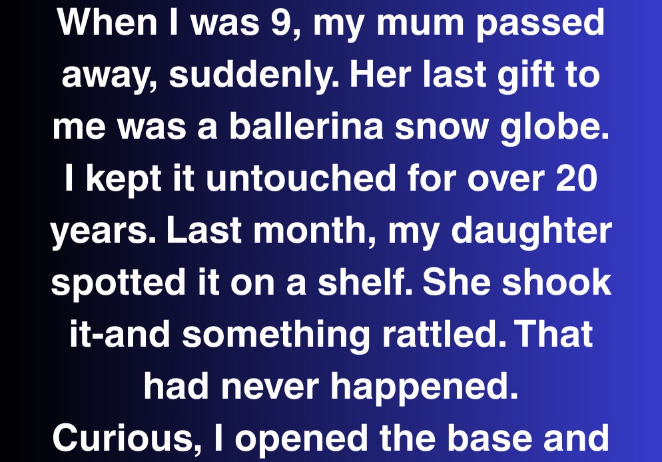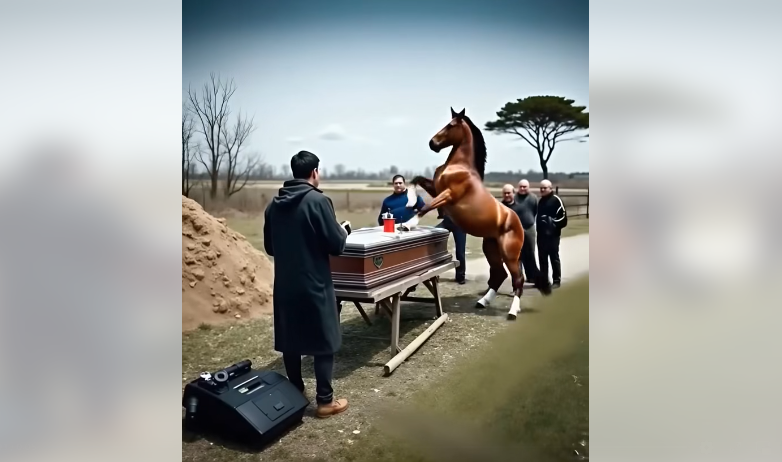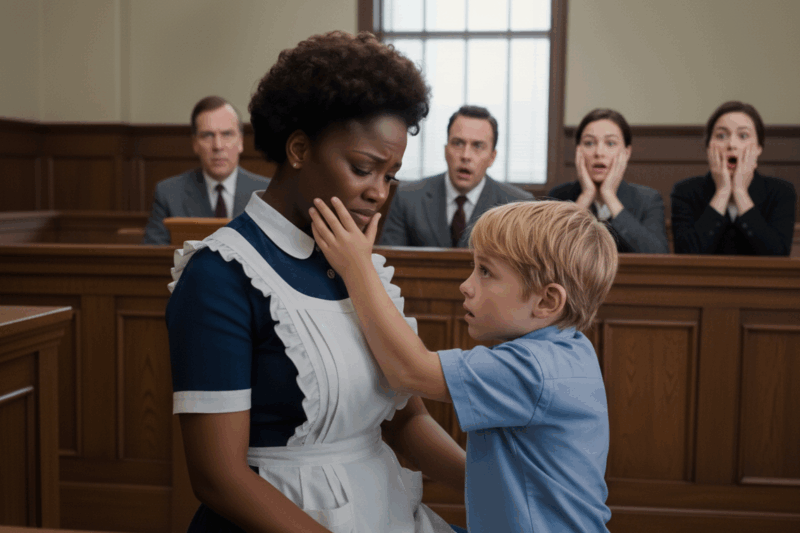When I was nine, my mother passed away unexpectedly. Her final gift to me was a delicate ballerina snow globe, its dancer frozen in a graceful twirl. For over two decades, I kept it untouched on a shelf, a quiet reminder of her. Last month, my daughter noticed it, her eyes catching the soft glint of the glass. She gave it a gentle shake, and a faint rattle echoed inside—something I’d never heard before. Intrigued, I carefully pried open the base and discovered a small, yellowed roll of paper taped inside, covered in my mother’s familiar handwriting.
The note read: “For when you’re ready. Begin with your father’s old truck. Check behind the seat.”
My pulse quickened. I hadn’t laid eyes on that truck in years. It had been stored in my aunt Hira’s barn since my mother’s funeral. My father left when I was young, and my memories of him were faint, blurred by time. My mother rarely spoke of him, even when I pressed her for answers.
The next morning, I buckled my daughter into the car, and we drove two hours to Aunt Hira’s farm. The truck sat in the barn, its paint faded by the sun, tires deflated, and a faint smell of dust and decay lingering inside. My daughter scrunched her face at the odor as I tugged the creaky door open.
Behind the driver’s seat, I found a small bundle wrapped in cloth. Inside was a collection of old letters, a cassette tape, and a delicate gold chain adorned with a sapphire pendant I’d never seen before.
The letters were written to my mother—from my father.
I sat in the truck, perched on the worn leather seat, and read the first letter while my daughter ran off to chase chickens in the yard. His handwriting was rough but recognizable. He wrote of longing for us, of hoping to return, of wanting to “make things right when the moment was perfect.”
The postmarks revealed the letters were sent months after he’d supposedly vanished for good.
Confusion swirled in my mind. My mother always said he’d left when I was five, running off with a coworker and never looking back. Yet these letters painted a different picture. One mentioned a heated argument, a “terrible mistake,” and his decision to give her space. Another noted his attempts to call, only to find her number had changed.
The final letter, dated just two weeks before her death, said he was coming to see us, bringing something “she’d never anticipate.”
My hands trembled as I held the paper.
Aunt Hira wandered out, wiping her hands on her apron. I showed her the letters. She averted her gaze for a moment before saying, “Your mother was in pain. Her choices weren’t always the wisest.”
I asked her directly—did my mother keep my father away?
With a heavy sigh, she nodded. “She feared he’d take you away. That you’d love him more. After what she believed he did… I don’t think she ever truly let go of the hurt.”
My world tilted. The story I’d carried for twenty years unraveled in an instant.
That evening, after my daughter was asleep, I bought an old cassette player from a local thrift shop and listened to the tape in my room. It was my father’s voice. He sang a lullaby I didn’t know, his voice breaking mid-song. Then he spoke: “For my little Zahra, so you’ll always know I loved you.”
Tears came so fiercely I could hardly catch my breath.
The next day, I began searching. I scoured old records and reached out to old contacts. After days of dead ends, I found someone who told me my father had passed away twelve years ago from liver failure. No known family remained.
But I wasn’t ready to let go.
I tracked down the hospital where he’d spent his final days. When I called and explained who I was, the nurse paused. “You’re Zahra?” she asked.
My heart skipped.
“He spoke of you every day,” she said. “Kept a photo by his bed. Said you loved to dance.”
She mentioned he’d left a box of belongings meant for “his daughter,” but no one had claimed it. I arranged for it to be shipped to me.
When the box arrived, I opened it with shaking hands. Inside was another cassette, a few faded photos—one of me in a tutu on stage, another of him cradling me as a baby, a picture I’d never seen before.
There was also a note: “I hope you uncover the truth. I hope you forgive her. Love, Dad.”
The second tape held a longer message. He spoke of his high school romance with my mother, how things unraveled when she suspected him of infidelity, though he insisted he was innocent. He admitted to his flaws—too many late nights at work, not enough time with us. But he never stopped loving her. Or me.
He tried to return, but she shut him out. He respected her boundaries, only to learn she’d told me he’d abandoned us. That broke his spirit. He wanted to set things right but didn’t want to cause me more pain.
So he waited. And waited too long.
I spent days grappling with the revelations.
The mother I’d revered had hidden the truth. But I could see why. She was frightened, proud, perhaps heartbroken. Grief can make people guard their hearts too tightly. And my father? Not a villain. Just a man excluded from his daughter’s life, too late to mend the rift.
One evening, I sat with my daughter and shared the whole story. Though she’s only six, she listened intently.
“So you had two parents who loved you, even if it was complicated?” she asked.
I laughed, tears streaming down my face. “Yes, sweetheart. I suppose I did.”
The story didn’t end there.
A week later, I visited my mother’s grave, bringing the snow globe, letters, and tapes. I spoke to her as if she could hear, telling her I loved her but wished she’d been truthful. I buried the box beside her headstone, letting go of the secrets.
Months passed, and life settled back into routine. I started dancing again, just for joy, twirling in the living room with my daughter giggling beside me. It felt like healing.
Then, one afternoon, a woman named Renata called. She introduced herself as my father’s cousin.
“I hope this isn’t too forward,” she said, “but I’ve been holding something for you.”
She lived two hours away. I drove to her small, cozy home the following weekend, greeted by walls lined with old photos and cat figurines. Renata embraced me warmly, like family.
“He wanted you to have this,” she said, handing me a manila envelope.
Inside was his will. He’d left me everything: a few savings bonds, a rusty car, and a small lakeside plot where he’d camped as a child.
The next weekend, I took my daughter to the lake. It was serene, with no cell service—just trees, water, and open sky. Standing there, barefoot in the dirt, I thought about how love can lie buried beneath years of silence.
I decided to keep the land.
Now, every summer, my daughter and I return. We pitch a tent, roast marshmallows, and talk about everything under the stars.
When I shared the story again with her, now a bit older, she asked, “Do you think Grandma meant for you to find all this?”
I’ve wondered that often.
Perhaps she did. Perhaps she knew I’d need to be ready to carry the truth. Perhaps that snow globe was more than a memento—it was her way of saying: You’re strong enough now.
Grief doesn’t move in neat paths. Neither does love.
For years, I thought I’d been abandoned. But the truth was, love was always there, tucked away, waiting for me to uncover it.
If you’re holding onto a keepsake from someone you’ve lost, look closer. There might be a story waiting to be found.




